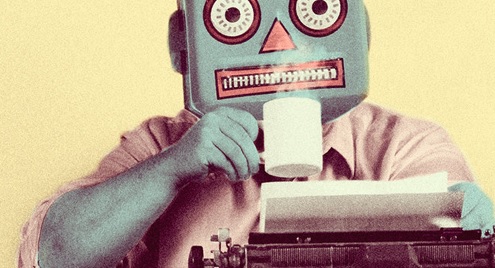- About us
- Asset Management
- Home
- Interpersonal relation
- Bridge of friendship-Philosophy to attract others
- Communicating to temperaments
- Taste Life
- Understand your personality and use your wisdom effectively
- Points store
- Production and operation
- Team building
If an Algorithm Wrote This, How Would You Even Know?
Submitted by XuGao on Wed, 03/18/2015 - 22:44
English
Let me hazard a guess that you think a real person has written what you’re reading. Maybe you’re right. Maybe not. Because, these days, a shocking amount of what we’re reading is created not by humans, but by computer algorithms. We probably should have suspected that the information assaulting us 24/7 couldn’t all have been created by people bent over their laptops.
It’s understandable. The multitude of digital avenues now available to us demand content with an appetite that human effort can no longer satisfy. This demand, paired with ever more sophisticated technology, is spawning an industry of “automated narrative generation.”
Companies in this business aim to relieve humans from the burden of the writing process by using algorithms and natural language generators to create written content. Feed their platforms some data - financial earnings statistics, let's say - and poof ! In seconds, out comes a narrative that tells whatever story needs to be told.
These robo-writers don’t just regurgitate data, either; they create human-sounding stories in whatever voice befits the intended audience. They’re that smart. And when you read the output, you’d never guess the writer doesn’t have a heartbeat.
Algorithms and natural languagegenerators have been around for a while, but they’re getting better and faster as the demand for them spurs investment and innovation. The sheer volume andcomplexity of the Big Data we generate, too much for mere mortals to tackle, calls for artificial rather than human intelligence to derive meaning from it all.
Set loose on the mother lode - especially stats - rich domains like finance, sports and merchadising - the new software platforms apply advanced metrics to identify patterns, trends and data anomalies. They then rapidly craft the explanatory narrative, stepping in as robot-journalists to replace humans.
The associated Press uses Automated Insights' Wordsmitn platform to create more than 3000 finaincial reports per quarter. It published a strory on Apple's latest record-busting earnings whithin minutes of their release. Forbes uses Narrative Science's Quill platform for similar efforts and refers to the firm as a partner.
But we should be forgiven a sense of unease. These software processes, which are, after all, a black box to us, might skew to some predicated norm, or contain biases that we can't possibly discern. Not to mention that we may be missing out on the insights a curious and fertile human mind could impart when considering the same information.
The mantra around all of this carries the usual liberation theme: Robo-journalism will free humans to do more reporting and less data processing.
That would be nice, but Kristian Hammond, Narrative Science's co-founder, estimates that 90% of news could be algorithmically generated by the mid-2020s, much of it without human intervention. If this projection is anywhere near accurate, we are on a slippery slope.
It's mainly robo-journalism now, but it doesn't stop there. As software stealthily replace us as communicators, algorithmic content is rapidly permeating the nooks and crannies of our culture.
Books are robo-written, too. Our phones can speak to us. Our home appliances can take commands. Our cars will be able to drive themselves. What does "human" even mean?
With technology, the next evolutionary step always seems logical. That's the danger. As it seduces us again and again, we relinquish a little part of ourselves. We rarely step back to reflect on whether, ultimately, we're giving up more than we getting.
Then again, who has time to think about that when there's so much information to absorb everyday? After all, we're only human.

